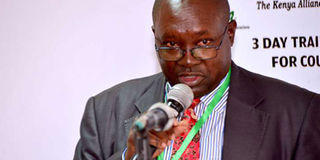Breaking News: Old Kijabe dam tragedy: Death toll rises to 45
Auditor-General's office blames inadequate funding for inefficiency

Deputy Auditor-General Humphrey Wanyama speaks during a training workshop organised by the Kenya Alliance of Resident Associations for county leaders at the Laico Regency Hotel in Nairobi on September 23, 2015. PHOTO | SALATON NJAU | NATION MEDIA GROUP
What you need to know:
- Mr Wanyama accused the government of going against the Kenya National Audit Commission Act by reviewing their budget.
- He said that they audit more than 1,200 state corporations and the insufficient personnel and facilities was slowing down their mandates that were set on strict timelines.
- Mr Wanyama raised concerns about public institutions that were frustrating efforts to audit them by not providing necessary documents.
The Auditor-General’s office has cited insufficient funding as a major hindrance to efficient services.
Speaking during a training workshop for county leaders, Deputy Auditor-General Humphrey Wanyama said lack of funding was undermining their job.
Mr Wanyama said the office had been allocated Sh2.5 billion by the National Treasury instead of the Sh6 billion they had requested for their budget.
“Our department requires a lot of funds as remuneration as we travel and spend days in many areas working, hence the money we are given is not enough,” said Mr Wanyama.
Mr Wanyama accused the government of going against the Kenya National Audit Commission Act by reviewing their budget.
He said the office audits more than 1,200 state corporations and the insufficient personnel and facilities were slowing down their mandates that were set on strict timelines.
Mr Wanyama raised concerns about public institutions that were frustrating efforts to have them audited by not providing necessary documents.
“Without sufficient response from clients, the Auditor-General cannot determine adequately whether public money was stolen or misappropriated," he said.
On the issue of accuracy, the deputy auditor-general said their reports were thoroughly done.
“The auditor-general only works with the information that is given to him within the stipulated timeline, which should be within six months after the end of every financial year,” said Mr Wanyama.
He added that the Sh67 billion indicated in the Auditor-General’s report did not necessarily mean that money had been lost, but that it was unaccounted for.
“We did not say that Sh67 billion was lost but we meant it was unaccounted for either through fraud, misappropriation, misapplication or embezzlement,” said Mr Wanyama.





